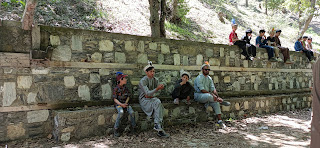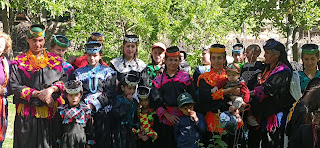Σάββατο 22 Ιουνίου 2024
Δευτέρα 17 Ιουνίου 2024
Σάββατο 15 Ιουνίου 2024
Mrachwaki Joshi 2024
Mrachwaki
Joshi
It is the festival
of the berry harvest. Mrach are the berries and waki is the harvest season.
Berries are a very nutritious food for Kalash. In addition to fresh, the
residents dry them. There are many types of mulberry and each type produces
different berries in terms of taste, texture, size, color and beneficial
properties. For each of these, the language of the Kalash has a special word. Dried
berries are stored to be eaten in winter.
The events of the
berry harvest festival mark the beginning of preparations for moving the herds
to the mountain upper pastures.
The ripening of the berries is combined with the melting of the snow and the appearance of grass for the herds.
The "observers
of the movements of the sun" announce the preparation of the events for
the festival. The climax of the celebration includes the shepherds' invocations
to the god Mohadeo before their departure for the mountains.
The day before,
preparations are made in the area of the stables, corrals. All offerings,
breads, dairy products mainly white cheese, flour are placed in bags [formerly
in leather pouches]
On the day of the
small Joshe festival, the inhabitants of each settlement gather in the dance
area and with the rhythm of the sacred drums prepare for the events of the day.
Before sunset the
shepherds of the valley ascend to the altar of Mohadeo in Batrik village,
carrying with them all the produce which they had prepared in their corrals.
First the Saras ceremony takes place and then they dedicate the offerings to
the altar. The shepherds turn to Mohanteo, the ruler of their valleys with
prayers and supplications concerning their protection during the ascent and stay
in the mountain upper pastures.
After the ceremony
they distribute their cheeses to all the men and boys present.
Then everyone descends from the altar to the old choir stand above Bashali in the village of Batrik. Together with the women holding mulberry leaves they all proceed together to Batrik's great dance hall where they will dance the last dances of little Joshi.
The berries are harvested by the women and children of each family. A boy climbs the tree holding a long stick and tries to shake the branches with ripe berries. Women and girls spread sheets around the trunk. They collect the berries and put them in "saveo" {disc-shaped baskets}, and place them on the roofs of their houses to dry.
Πέμπτη 13 Ιουνίου 2024
Re-open the Bashali in Batrik , Kalasha valleys, with the help of donors and Koinotopia.
The existing anthropological literature about the
Kalasha menstrual house assumes
that the bashali
(basˇa´li) is
a
place where
women are restricted, confined,
exiled (Schomberg 1938; Siiger 1956; Graziosi 1961; Palwal 1972; Robertson 1896).
An image of the goddess Dezalik was kept in the Bashali, or women’s house; Men are not
allowed to enter the Bashali, where women are relegated
when they are in a state of impurity.
The segregation of women during the menstrual
period and at childbirth is of course
practiced among many different
peoples. The horror felt for their
state, considered impure, leads primitive communities
to take all the necessary precautions to avoid dangerous contacts between impure women and all other members of the group.
The Bashali in the
village of Batrik did not work for a long time due to major damage to the
electrical and plumbing systems and the lack of water drainage.
Batrik's women were
obliged to go to Bashali who were in other villages.
All start with a
meeting.
A meeting of the
representatives of the residents of Batrik was held, consisting of them, Ghani,Jani
Gul, Rumeela, Kamazar, Jamlana, Gurum, Khorma Gul, Anwas Bigim, Zakhira,
Gulshana, Nasira, Fatima, Sabira, Gul Mer,
Rashi Beg, Rahmat Ullah, Gul Mia, Noor Shairan, Basir Muhammad, Ghazi
Muhammad and it was decided to immediately start work on the restoration of the
site.
Who will get in?
Is it necessary to
purify or even sacrifice an animal?
The materials were
purchased from the city of Chitral and after 7 days of intensive work Bashali
was opened again for the women of Batrik.
Women at work: Meet the tomb raider from Kalash..... SAYED GUL KALASH
Women at work: Meet the tomb raider from Kalash Sayed Gul has overcome great obstacles for the career of her dreams—archaeology ...

-
Traditional Dress of Kalasha Women …… Most Pakistanis as well as foreign tourists in Pakistan easily recognize Kalasha women’s dress, alth...
-
The traditional Dress of Kalasha Men The traditional costume of a Kalasha man of rank namusi moch, using Darling‘s descriptions, consiste...
-
S’is’au Women's Purifications - My purification “istongas” 18.12.2024 S’is’ au is the purification of women with offerings of br...









































































